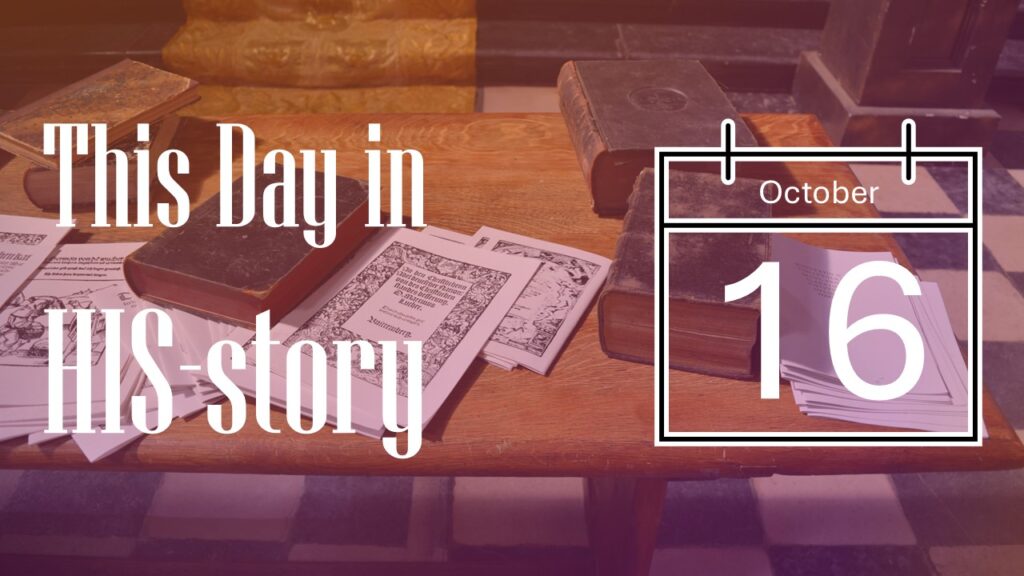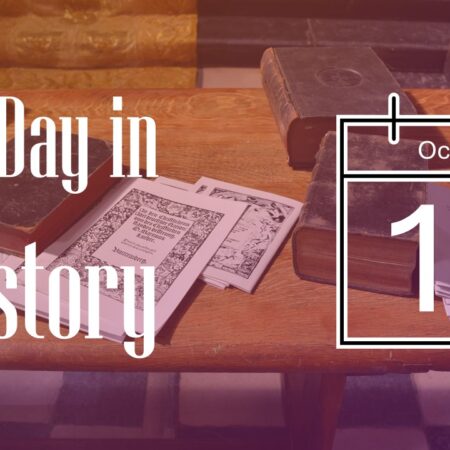
1555
Queen Mary ascended the throne of England in 1553. In subsequent years, she had at least two hundred people put to death (often by fire) for their religious convictions. To history she became known as “Bloody Mary,” although, in truth, she killed far fewer people per year than her brutal father. It was the godliness of many of her victims made them stand out.
Mary’s father, King Henry VIII had separated the Church of England from the Roman Catholic church, but he had not reformed the church’s practices or doctrines. On Henry’s death, his young son Edward became King. Many of Edward’s advisors tried to move the English church in the direction of a more Bible-based Christianity. Two such men were Nicholas Ridley and Hugh Latimer.
The scholar Nicholas Ridley had been a chaplain to King Henry VIII and was Bishop of London under his son Edward. He was a preacher beloved of his congregation whose very life portrayed the truths of the Christian doctrines he taught. In his own household he had daily Bible readings and encouraged Scripture memory among his people.
Hugh Latimer also became an influential preacher under King Edward’s reign. He was an earnest student of the Bible, and as Bishop of Worcester he encouraged the Scriptures be known in English by the people. His sermons emphasized that men should serve the Lord with a true heart and inward affection, not just with outward show. Latimer’s personal life also re-enforced his preaching. He was renowned for his works, especially his visitations to the prisons.

When Mary became Queen of England, she worked to bring England back to the Roman Catholic Church. One of her first acts was to arrest Bishop Ridley, Bishop Latimer, and Archbishop Thomas Cranmer. After serving time in the Tower of London, the three were taken to Oxford in September of 1555 to be examined by the Lord’s Commissioner in Oxford’s Divinity School.
When Ridley was asked if he believed the pope was heir to the authority of Peter as the foundation of the Church, he replied that the church was not built on any man but on the truth Peter confessed — that Christ was the Son of God. Ridley said he could not honor the pope in Rome since the papacy was seeking its own glory, not the glory of God. Neither Ridley nor Latimer could accept the Roman Catholic mass as a sacrifice of Christ. Latimer told the commissioners, “Christ made one oblation and sacrifice for the sins of the whole world, and that a perfect sacrifice; neither needeth there to be, nor can there be, any other propitiatory sacrifice.” These opinions were deeply offensive to Roman Catholic theologians.
Both Ridley and Latimer were burned at the stake in Oxford on this day, October 16, 1555. As he was being tied to the stake, Ridley prayed, “Oh, heavenly Father, I give unto thee most hearty thanks that thou hast called me to be a professor of thee, even unto death. I beseech thee, Lord God, have mercy on this realm of England, and deliver it from all her enemies.”
Ridley’s brother had brought some gunpowder for the men to place around their necks so death could come more quickly, but Ridley still suffered greatly. With a loud voice Ridley cried, “Into thy hands, O Lord, I commend my spirit…”, but the wood was green and burned only Ridley’s lower parts without touching his upper body. He was heard to repeatedly call out, “Lord have mercy upon me! I cannot burn..Let the fire come unto me, I cannot burn.” One of the bystanders finally brought the flames to the top of the pyre to hasten Ridley’s death.
Latimer died much more quickly; as the flames quickly rose, Latimer encouraged Ridley, “Be of good comfort, Mr. Ridley, and play the man! We shall this day light such a candle by God’s grace, in England, as I trust never shall be put out.”
The martyrdoms of Ridley, Latimer, and Thomas Cranmer are today commemorated by a Martyrs’ monument in Oxford. The faith they once died for can now be freely practiced in the land.
1569
HT:Christian History Institute
Gaspard II de Coligny was a French admiral. He sought to protect the Protestants in France and established colonies of these “Huguenots” overseas. In France he led the Huguenots capably if not brilliantly in the civil war that developed between them and the Catholic majority. His success at La Roche-l’Abeille and his ability to hold his forces together in defeat forced the government to negotiate.

However, he was assassinated at the beginning of the St. Bartholomew’s Day massacre (1572) in which Catholics slaughtered thousands of Protestants across France. On this day, 16 October 1569, three years before his assassination, Coligny had been wounded, his army shattered, himself declared an outlaw by the government, cursed by the pope, and his castle burned to the ground by order of Catherine de Medici, he wrote the following words in a letter to his children:
“We must follow Jesus Christ, our Captain, who has marched before us. Men have stripped us of all they could; and if this is still the will of God, we shall be happy, and our condition good, seeing this loss has not happened through any injury we have done to those who have inflicted it, but solely through the hatred they bear toward me, because it has pleased God to make use of me to aid his Church. For the present, it suffices that I admonish and conjure you, in the name of God, to persevere courageously in the study of virtue.”
1790
Daniel Rowland was puzzled. Ordained in the Church of England early in 1734, he was assigned to be a curate (clergyman to a parish) in South Wales. However, he noticed that his people were deserting his church to listen to non-conformist preachers (that is, preachers who did not conform to the Church of England). Why? he wondered. What do they have that I don’t?

There was one way to find out. Daniel went to listen to his rivals himself. Although a clergyman, he had never been converted to Christ. As a matter of fact, he enjoyed hunting a whole lot more than he enjoyed the word of God.
One day, he stood in a crowd listening to one of the nonconformists, Griffith Jones. Jones was well-known for his charity school. The speaker saw Daniel’s restless expression and exclaimed, “Oh for a word to reach your heart, young man!” His concern deeply touched Daniel, who soon became a Christian. After that, he visited with Griffith Jones at every opportunity, although they lived thirty miles apart. It wasn’t a matter of just jumping into a car either.
Fortunately, Daniel had a strong constitution. For his ordination, he had walked 200 miles to London and back! He always moved and spoke quickly. His energy attracted others. Daniel became a powerful preacher. But people left his sermons frightened and not knowing how to repent. Soon a more experienced minister taught Daniel to show his listeners how the blood of Christ could free them from the fear and guilt that his earlier sermons had inspired. For fifty-five years Daniel Rowland was one of the leading evangelists of Wales.
Another Welsh revival leader, Howell Harris said years later, “The power that continues with him is uncommon.” So many people flocked to hear him, that clergymen of the established church grew jealous. They threw him out of his church on the grounds that he didn’t restrict his preaching to his own parish. Rowland’s reply was that there were so few ministers preaching the gospel, he had to take the truth wherever people were.
Later, the Church of England withdrew its license from him. Rowland’s followers built him an independent church. Even after a mob beat him with sticks and stones; even after a man drew a gun on him and pulled the trigger (it misfired), Rowland kept preaching. Pastors who had been his friends withdrew their friendship because he did not meet one or another of their criteria. Rowland kept preaching. 14,000 people once attended a communion service he led. Since his chapel held only 3,000, people had to await their turn outside: Such was his impact.
“Judge your own selves,” he urged his listeners. “Look upon the behavior of others through the spectacles of love. Entreat the Lord to set a watch before your mouth. Do with another man’s name as you would with yours.”
Daniel died on this day, October 16, 1790. One of the men that he led to Christ was Thomas Charles, who went on to found the British and Foreign Bible Society.
